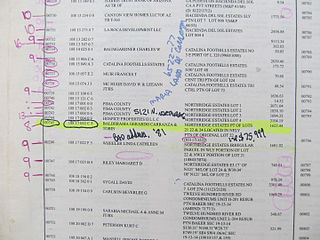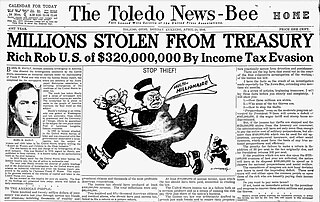Related Research Articles

The United States of America has separate federal, state, and local governments with taxes imposed at each of these levels. Taxes are levied on income, payroll, property, sales, capital gains, dividends, imports, estates and gifts, as well as various fees. In 2020, taxes collected by federal, state, and local governments amounted to 25.5% of GDP, below the OECD average of 33.5% of GDP. The United States had the seventh-lowest tax revenue-to-GDP ratio among OECD countries in 2020, with a higher ratio than Mexico, Colombia, Chile, Ireland, Costa Rica, and Turkey.
Tax noncompliance is a range of activities that are unfavorable to a government's tax system. This may include tax avoidance, which is tax reduction by legal means, and tax evasion which is the criminal non-payment of tax liabilities. The use of the term "noncompliance" is used differently by different authors. Its most general use describes non-compliant behaviors with respect to different institutional rules resulting in what Edgar L. Feige calls unobserved economies. Non-compliance with fiscal rules of taxation gives rise to unreported income and a tax gap that Feige estimates to be in the neighborhood of $500 billion annually for the United States.
An individual retirement account (IRA) in the United States is a form of pension provided by many financial institutions that provides tax advantages for retirement savings. It is a trust that holds investment assets purchased with a taxpayer's earned income for the taxpayer's eventual benefit in old age. An individual retirement account is a type of individual retirement arrangement as described in IRS Publication 590, Individual Retirement Arrangements (IRAs). Other arrangements include employer-established benefit trusts and individual retirement annuities, by which a taxpayer purchases an annuity contract or an endowment contract from a life insurance company.
Tax avoidance is the legal usage of the tax regime in a single territory to one's own advantage to reduce the amount of tax that is payable by means that are within the law. A tax shelter is one type of tax avoidance, and tax havens are jurisdictions that facilitate reduced taxes. Tax avoidance should not be confused with tax evasion, which is illegal.

A tax lien is a lien which is imposed upon a property by law in order to secure the payment of taxes. A tax lien may be imposed for the purpose of collecting delinquent taxes which are owed on real property or personal property, or it may be imposed as a result of a failure to pay income taxes or it may be imposed as a result of a failure to pay other taxes.
The rules governing partnership taxation, for purposes of the U.S. Federal income tax, are codified according to Subchapter K of Chapter 1 of the U.S. Internal Revenue Code. Partnerships are "flow-through" entities. Flow-through taxation means that the entity does not pay taxes on its income. Instead, the owners of the entity pay tax on their "distributive share" of the entity's taxable income, even if no funds are distributed by the partnership to the owners. Federal tax law permits the owners of the entity to agree how the income of the entity will be allocated among them, but requires that this allocation reflect the economic reality of their business arrangement, as tested under complicated rules.
A Taxpayer Identification Number (TIN) is an identifying number used for tax purposes in the United States and in other countries under the Common Reporting Standard. In the United States it is also known as a Tax Identification Number or Federal Taxpayer Identification Number. A TIN may be assigned by the Social Security Administration or by the Internal Revenue Service (IRS).
Tax shelters are any method of reducing taxable income resulting in a reduction of the payments to tax collecting entities, including state and federal governments. The methodology can vary depending on local and international tax laws.
Gregory v. Helvering, 293 U.S. 465 (1935), was a landmark decision by the United States Supreme Court concerned with U.S. income tax law. The case is cited as part of the basis for two legal doctrines: the business purpose doctrine and the doctrine of substance over form. The business purpose doctrine is essentially that if a transaction has no substantial business purpose other than the avoidance or reduction of Federal tax, the tax law will not regard the transaction. The doctrine of substance over form is essentially that for Federal tax purposes, a taxpayer is bound by the economic substance of a transaction if the economic substance varies from its legal form.
Tax protesters in the United States have advanced a number of arguments asserting that the assessment and collection of the federal income tax violates statutes enacted by the United States Congress and signed into law by the President. Such arguments generally claim that certain statutes fail to create a duty to pay taxes, that such statutes do not impose the income tax on wages or other types of income claimed by the tax protesters, or that provisions within a given statute exempt the tax protesters from a duty to pay.

Corporate tax is imposed in the United States at the federal, most state, and some local levels on the income of entities treated for tax purposes as corporations. Since January 1, 2018, the nominal federal corporate tax rate in the United States of America is a flat 21% following the passage of the Tax Cuts and Jobs Act of 2017. State and local taxes and rules vary by jurisdiction, though many are based on federal concepts and definitions. Taxable income may differ from book income both as to timing of income and tax deductions and as to what is taxable. The corporate Alternative Minimum Tax was also eliminated by the 2017 reform, but some states have alternative taxes. Like individuals, corporations must file tax returns every year. They must make quarterly estimated tax payments. Groups of corporations controlled by the same owners may file a consolidated return.
Crane v. Commissioner, 331 U.S. 1 (1947), was a case heard before the United States Supreme Court concerning the value, for tax purposes, of inherited property with a nonrecourse mortgage encumbering it. According to Boris I. Bittker, Crane "laid the foundation stone of most tax shelters."
Helvering v. Bruun, 309 U.S. 461 (1940), was an income tax case before the Supreme Court of the United States. It is notable for holding that under section 22(a) of the Revenue Act of 1932, a landlord realizes a taxable gain when he repossesses property, the value of which has increased because the property was improved by a tenant.
Treasury Regulation 1.183-2 is a Treasury Regulation in the United States, outlining the taxes owed from income deriving from non-business, non-investment activity. Expenses relating to for profit activities, such as business and investment activities, are generally tax deductible under sections 162 and 212, respectively, of the Internal Revenue Code. However, expenses relating to not for profit activities, such as hobbies, are generally not tax deductible.

Zarin v. Commissioner, 916 F.2d 110 is a United States Third Circuit Court of Appeals decision concerning the cancellation of debt and the tax consequences for the borrower for U.S. federal income tax purposes.
The all-events test, under U.S. federal income tax law, is the requirement that all the events fixing an accrual-method taxpayer's right to receive income or incur expense must occur before the taxpayer can report an item of income or expense.
The assignment of income doctrine is a judicial doctrine developed in United States case law by courts trying to limit tax evasion. The assignment of income doctrine seeks to "preserve the progressive rate structure of the Code by prohibiting the splitting of income among taxable entities."
A tax protester is someone who refuses to pay a tax claiming that the tax laws are unconstitutional or otherwise invalid. Tax protesters are different from tax resisters, who refuse to pay taxes as a protest against a government or its policies, or a moral opposition to taxation in general, not out of a belief that the tax law itself is invalid. The United States has a large and organized culture of people who espouse such theories. Tax protesters also exist in other countries.
For United States income tax purposes, a business entity may elect to be treated either as a corporation or as other than a corporation. This entity classification election is made by filing Internal Revenue Service Form 8832. Absent filing the form, a default classification applies. U.S. corporations of the type that can be publicly traded must be treated as corporations. There is a list of specific foreign entities that must be treated as corporations. The election is effective for Federal income tax purposes.

Under the federal law of the United States of America, tax evasion or tax fraud, is the purposeful illegal attempt of a taxpayer to evade assessment or payment of a tax imposed by Federal law. Conviction of tax evasion may result in fines and imprisonment. Compared to other countries, Americans are more likely to pay their taxes on time and law-abidingly.
References
- ↑ The Economic Substance Doctrine in the Current Tax Shelter Environment: Remarks by Donald L. Korb, Chief Counsel of the Internal Revenue Service
- ↑ See subsection (o) of 26 U.S.C. § 7701.
- ↑ See ACM Partnership v. Commissioner, 157 F.3d 231 (3rd Cir. 1998), affirming 73 T.C.M (CCH) 2189 (1997), cert. denied, 526 U.S. 1017 (1999).
- ↑ "The Obameter: Require economic justification for tax changes". PolitiFact.
- ↑ Sec. 1409, Pub. L. No. 111-152, 124 Stat. 1029, 1067 (March 30, 2010).